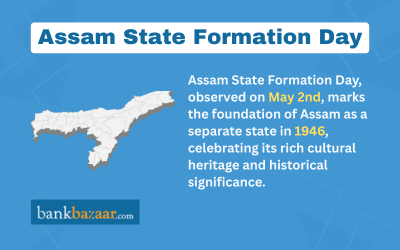Assam State Formation Day
Assam State Formation Day is observed every year on January 26, which coincides with India's Republic Day. This day holds historical and cultural importance for the people of Assam as it marks the official recognition of Assam as a state within the Indian Union on January 26, 1950, when the Constitution of India came into force.
Table of Contents
Historical Background of Assam Formation

Assam was initially a part of the British Bengal Province. In 1874, it was separated and designated as a Chief Commissioner’s Province by the British administration. After India gained independence in 1947, Assam became one of the original constituent states of the Indian Union. With the adoption of the Indian Constitution in 1950, Assam officially became a full-fledged state.
Over the years, several other northeastern states were carved out of Assam to better administer the region and represent its diverse ethnic groups. These include Nagaland (1963), Meghalaya (1972), Mizoram (1987), and Arunachal Pradesh (1987).
Significance of Assam State Formation Day
Assam State Formation Day is significant as it commemorates the state’s journey from colonial rule to becoming a sovereign part of India. It highlights Assam’s rich cultural heritage, unity in diversity, and its contribution to the Indian freedom movement. The day also serves as a reminder of the sacrifices made by leaders and freedom fighters to secure a unique identity for the state within the Indian Republic.
How Assam Celebrates Its Formation Day
Assam celebrates this day with great enthusiasm and pride. Official ceremonies are held in Guwahati, the state capital, as well as in district headquarters across Assam. The day begins with the hoisting of the national flag, followed by parades and cultural programs. Traditional Assamese dance forms such as Bihu and Sattriya, along with folk music and performances by various ethnic communities, are showcased to celebrate the state's rich traditions.
During the celebrations, the government also honors distinguished individuals from the state for their contributions in fields like literature, sports, social service, and education. Public awareness programs and exhibitions are organized to educate people about Assam’s historical journey and achievements.
Interesting Facts About Assam
Assam is internationally known for its tea plantations, producing one of the finest varieties of tea in the world. It also holds the distinction of having Asia’s first oil refinery in Digboi. The Brahmaputra River, one of the largest rivers in India, flows through the heart of the state, enriching its soil and ecosystem. Assam is also home to Kaziranga National Park, a UNESCO World Heritage Site famous for its population of one-horned rhinoceroses. These factors make Assam both an economic and ecological treasure.
Holiday and Cultural Importance
January 26 is observed as a public holiday in Assam, not only because it is Republic Day, but also due to its added significance as State Formation Day. Schools, colleges, and government offices organize special events, ensuring that the people, especially the younger generation, understand the value of this day in Assam’s historical and political context.

FAQs on Assam State Formation Day
- When is Assam State Formation Day celebrated?
It is celebrated every year on January 26, coinciding with Republic Day.
- Why is Assam Formation Day important?
It commemorates the formation and identity of Assam as a state within the Republic of India.
- Is Assam Formation Day a public holiday?
Yes, it is observed alongside Republic Day with cultural and official programs.
- What states were carved out of Assam?
Nagaland, Meghalaya, Mizoram, and Arunachal Pradesh were originally part of Assam.

Disclaimer
Credit Card:
Credit Score:
Personal Loan:
Home Loan:
Fixed Deposit:
Copyright © 2026 BankBazaar.com.